#pests
Text
here’s a fun animal I saw in Borneo: the mammal!
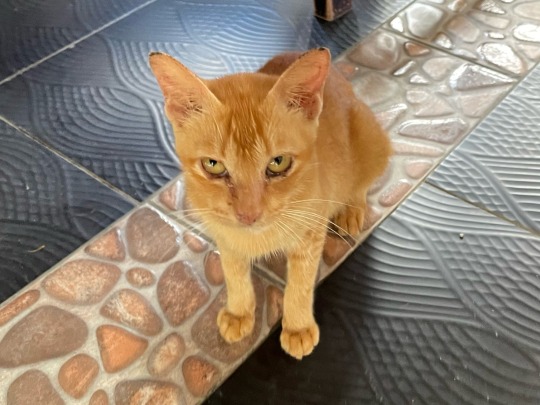
unlike the rest of us, mammals are endothermic and produce their own body heat—but they’re not birds! it is covered in a thick coat of hair (you guessed it, separate evolutionary origin from feathers) and secretes a fatty liquid from special glands to nurture its larvae. mammals can be found almost worldwide and are highly adaptable. this one was making odd squeaking noises, possibly begging for morsels of food.
here’s another mammal I saw. pretty sure it’s a different species but I’m not an expert on identifying them
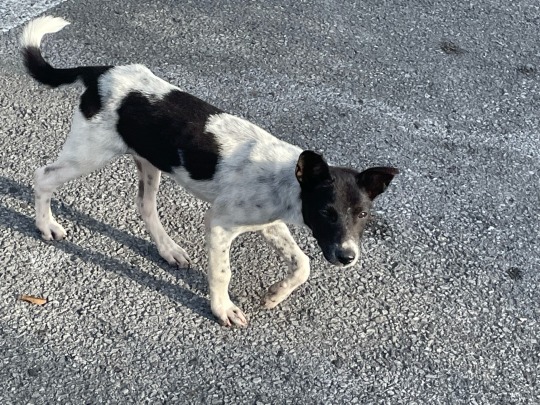
fun mammal fact: some are curiously soft to the touch! try palpating the next mammal you see, but please be careful. some may bite!
10K notes
·
View notes
Text
Difficult to get rid of, difficult to face because you're too squeamish (or too sympathetic), etc.
–
We ask your questions so you don’t have to! Submit your questions to have them posted anonymously as polls.
#polls#incognito polls#anonymous#tumblr polls#tumblr users#questions#pests#home#polls about critters
568 notes
·
View notes
Text

#photography#explore#nature#science#adorable#gifs#education#lol#weevil#beetle#beetles#coleoptera#curculionoidea#grain-eating#pests#insect#entomology#animals#herbivorous#invertebrates#zoology#ecology#flying#wings#wing#slow motion#gif
31 notes
·
View notes
Text
I started reading the book 'Pests' by Bethany Brookshire. I thought it would be a book filled with information on how to protect your garden without causing any harm to animals. I could not have been more wrong, but soon it didn't matter, because I was drawn in immediately. This book is written by a brilliant scientist, who presents to you, the history, the data, the results and the cultural context of pests all around the world. It starts with squirrels, but then goes on to talk about pythons, pigeons, cats, rats, mice, frogs, coyotes, wolves, elephants, dogs, raccoons, deer, bears – and how they've been seen as a pest, most often for no fault of their own.
I learned about the numerous ways people in the past have created a 'pest' problem for themselves, and how they went on resolving it, and honestly I was shocked at the most of it. I did not know that human scientists developed specific plagues for animals in order to get rid of them. I also had no idea how quickly humans turned the perception of a certain animal from 'useful' to 'pest', without even realizing they're responsible for the behaviour of the animal in the first place. Also the number of times humans have attempted to introduce a predator in order to get rid of an invasive species – only to immediately cause a new invasive species, absolutely incredible.
I was surprised to find out that some specific animals could be pests at all, for example, elephants. Absorbing the information presented to me thus far, I thought elephants were nothing short of wonderful and welcome in anyone's life – but, the story describes them eating the entire fields worth of grain, in only one night. And due to their size, they're unstoppable. They've destroyed houses, and even killed people, as a result of trying to get to the food. The elephants are a protected species, so the locals have been forced to develop different way of co-existing, namely, to stop growing grain and try to find different ways of survival and sustenance. There have been numerous other attempts to protect the fields from them, but how would you protect anything from an elephant? The only thing they're scared of, are bees. And if there's food to be gained, they'll overcome the fear of the bees too.
Did you know that if mice multiply too much, they'll have a mice plague that will wipe them out, without human interference? Mice and rats are described as the animals closest to us – because they live where we live, eat what we eat, and learn whatever it takes to find their way in the land of humans. And it seems, we have the same problems as well.
One of my favourite little piece of knowledge in this book: the scientists studying the snakes in a lab name the snakes after Slytherins – so they have Snape, Draco, Crabbe, Goyle, and Bellatrix. It was amazing to listen about Snape the snake.
The author of this book is incredibly unbiased, and shows her love for every animal mentioned, but also understanding and compassion for people who have felt wronged, violated, helpless and cornered by the animal, and how awful it feels to not be able to protect their homes and livelihoods from an animal invading their territory. In author's mind, the animals are not at fault, because all they've been trying to do is survive, get to the source of food, for them this is foraging. For us, it's nature taking from us what we intended for ourselves.
The problem of seeing animals as pests, comes often from the perception of us being the dominating species, and having the right to remove or introduce or change animals, by how convenient and pleasing we find them. She sourced the problems from negative experiences, loss, violation and danger, but also from culture, colonialism, religion, behaviours of the people around us. Most children have no concept of danger or pests – babies in a study would reach out curiously seeing a picture of snake. Perception of which animal is good and which one is bad, comes with culture, experience and the behaviour of everyone else around it. And our collective perception comes from whether the animal is rare, whether it lives close to us, if we have to adjust our lives because of it or not, if we have had negative experiences or not, whether it can hurt us, whether we have something the animal wants (food) and tries to get from us.
I recommend this book to anyone who'd like to know more about the history of humans trying to live alongside – or refusing to live alongside certain animals. And anyone dealing with any kind of pest, or just not understanding why animals act the way they do around humans.
I come out from reading this, feeling no more wise on how to keep the pests out – except for, don't leave the food outside the house where animals can get to it, that's the #1 reason for most scenarios – but feeling way more understanding and at ease about animals that are perceived as pests. I know solutions that have been tried to deal with them, I know what didn't work, and I know how badly some collective solutions can become. I understand we need to find a way to live with them as our neighbours, not enemies, not violators of our property. And most often, just being responsible about where you leave your food, how much animals you tempt to come close to you, how you reward them for interacting with you, is more than a half of the solution.
#pests#bethany brookshire#sustainable culture#living alongside animals#coexisting with animals#environmentalism#animal science#animal research#ways scientists and people have dealt with animals in the past#educational#resources#pssst if you want to listen to the audiobook i can send it to you#i love the audio version
242 notes
·
View notes
Note
To the fairy boys, there's a dumb question that's been bugging me, do mosquitos, leeches, duck mites, ticks, fleas, and other such things bother you? Or do they leave you alone?
"They do not, fortunately!"
"Those are pests for the mortals to deal with. Their business doesn't involve us."
"Leeches are funky, though."
#answered ask#fairy au#dca fairy au#sundrop fairy#moondrop fairy#lunar fairy#ask the fairy twins#ask lunar#pests#in character response
71 notes
·
View notes
Text
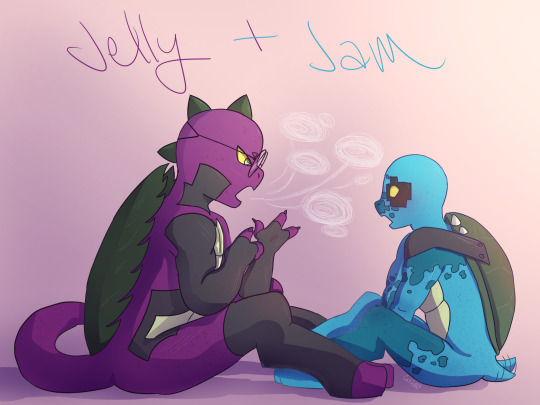

skibbles by @bluepeachstudios
you should read their fic it's so much fun
#tmnt#tmnt 2003#teenage mutant ninja turtles#skittles#tmnt au#babies!#they get sons#dark turtles#dark leonardo#dark donatello#dark raphael#dark michelangelo#sanzio#davinci#simoni#bardi#they are#pests#and i love them#my art
400 notes
·
View notes
Text

Red and Black Striped Shieldbug, Graphosoma italicum and Brassica Shieldbug, Eurydema oleracea Canon 400D EF 100 2.8 f/8 1/320 iso: 800 Celakovice-Jirina, Czech Republic 9/23/2010
#Hemiptera#Shieldbugs#stinkbugs#eurydema#graphosoma#insects#invertebrates#Pests#Macro#grasslands#insectphotography#macrophotography#insect#canon
31 notes
·
View notes
Text
Are Insects Pests? On Loving the Unloved
(Originally posted at my blog at https://rebeccalexa.com/are-insects-pests-on-loving-the-unloved/)
I do a lot of internet searches in the process of writing my articles and books, putting together class materials, and so forth. Sometimes the subject of insects comes up, and that often includes researching individual species. What gets me is how often some of the first search results won’t be informational sites, but those dedicated to labeling insects “pests” and eradicating them. I get that some species are potentially more problematic when found in or around someone’s home; cockroaches and bedbugs come to immediate mind. But again and again, regardless of what sorts of insects I was searching for, many times the results included exterminator sites.
The fact that so many of the highest search results are dedicated to killing insects suggests there’s a lot of demand for such services and products. It makes me sad, honestly, because we’re right in the middle of an insect apocalypse. There’s already a lot of apathy about conserving invertebrates in general, and “bugs” in particular; many folks simply don’t get why it’s so important to protect the creepy-crawlies of the world. And when it’s common for any insect found in a house to be routinely smashed and discarded without a second thought, regardless of species, “save the bugs!” may seem like an ineffective rallying call indeed.
But let’s look at a few of those search results first, shall we?
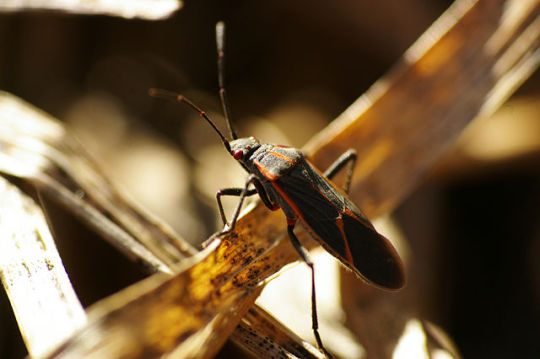
My favorite search engine is Ecosia; I have it set up as my default search engine in my browser. They use the profits from ads to plant trees, and as of this writing they’ve planted over 150 million trees. I use Google as a backup, if Ecosia’s results aren’t getting me what I want.
The other day I wanted to know about wasp species in Washington. So I searched Ecosia for “Washington wasp species”, and the ninth result on the first page was a pest control site:

Google was even worse. It took scrolling down only to the third result on the first page to end up with a pest control site:
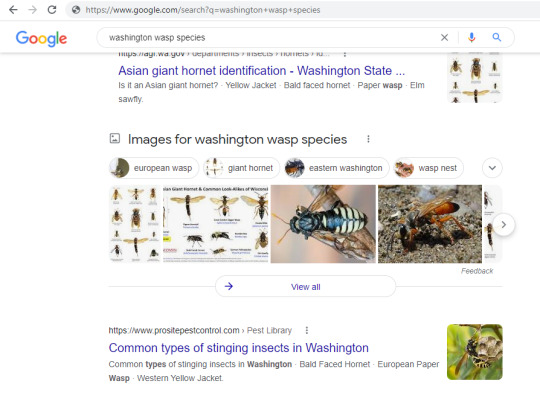
Okay, so wasps don’t exactly have a great P.R. team., and media furor over the Asian giant hornet (Vespa mandarinia) didn’t help the results become any friendlier, either. I figured I’d try a few more very general searches just to see how long it took to hit a pest control site or other site that talked about eradicating the insects I was searching for:
True Bugs: Ecosia 8th on page 1, Google 1st on page 2
Bees: Ecosia 3rd on page 1, Google 3rd on page 1
Grasshoppers: Ecosia 2nd on page 2, Google 5th on page 1 (this was without filtering out things like the Grasshoppers Minor League Baseball team)
Crickets: Ecosia 3rd on page 1, Google 3rd on page 1
Weevils: Ecosia 1st on page 1, Google 2nd on page 1 (never mind that the vast majority of weevils are harmless to us and our food.)
Beetles: Ecosia 1st on page 2, 4th on page 1
Oregon Beetle Species: Ecosia 1st on page 2, Google 4th on page 1
Unsurprisingly when I searched for “fireflies” and “butterflies”, I went back several pages on both search engines and didn’t find anyone advocating for the mass slaughter of these beloved insects. You’d think bees would get the same treatment what with all the “save the bees” campaigns over the past few years, but the 3rd result from both search engines was from a site called “Pest World for Kids”, run by the National Pest Management Association. Really?
Okay, so admittedly this was definitely NOT a scientific study. And I recognize there are a number of factors determining search results, SEO, etc. like how large and popular a given site is, age of the site, backlinks, etc. Still, given how high up in the ranking sites treating insects as pests were, and how many of the recommended related searches had to do with things like whether the insects being searched for would bite, or how to get rid of them, that suggests a lot of people are searching for how to go to war with insects rather than learning about them as unique beings.
On the bright side, most of the results were site that genuinely wanted to educate people about various insects on their own merits. So it’s not as though everything is terrible (unless you’re a weevil, for whom almost all the top search results were pest-related.) Whether those sites got as many genuine clicks as the pest-related ones, I couldn’t tell you. But it was nice to see them anyway.
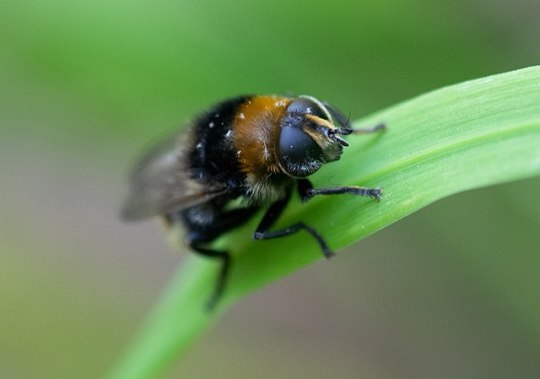
Maybe I’m in the minority when I wish that people would spend less time trying to eradicate insects, and more time learning about them. It’s just that most folks seem to ignore them unless they become a perceived nuisance. I’ve had to deal with problem insects before–narcissus bulb flies (Merodon equestris) in the garden, pantry moths (Plodia interpunctella) in the flour, etc. And yes, sometimes that involves smushing them on sight, especially in the case of a non-native species.
But I also try to make an effort to learn about even these species. It’s not just to learn how to get rid of them, but to find out more about their adaptations and habits, where they came from, what makes them different from other insects–what makes the species what it is. It’s curiosity that drives me, and I find myself appreciating their ability to find a niche, even if it’s one that’s at odds with my own interests.
It also makes me really think about whether I really need to persecute a particular species, and how that affects my attitudes toward not just insects, but other living beings. When I stop and consider my actions toward another species, it breaks the conditioning that so many of us have to just see nature as something to serve us–only good if it does what we want, and bad if it goes against our wants and needs. And I find myself being able to make a more informed decision that, at times, may be summed up as “leave well enough alone.”
Hence the nest of black-tailed bumblebees (Bombus melanopygus) that has spent multiple years buzzing about the entryway of my garage. Hence the common house spiders (Parasteatoda tepidariorum) that are allowed space in the corners and window-wells of my home to help control flies that may buzz their way in on warm days. Hence the cabbage looper caterpillars (Trichoplusia ni) who get a reprieve in the garden, even though they go after cruciferous vegetables, because they never take everything, and they’re important food for other species. Some would easily justify my killing these and many others, simply for being mildly inconvenient, or just being in the wrong place at the wrong time.
But I prefer to coexist whenever possible, and to look beyond the “pest” label as well.
Did you enjoy this post? Consider taking one of my online foraging and natural history classes, checking out my other articles, or picking up a paperback or ebook I’ve written! You can even buy me a coffee here!
#long post#insects#invertebrates#bugs#arthropods#science#nature#scicomm#science communication#gardening#ecology#environment#environmentalism#pollinators#animals#wildlife#conservation#pests#extinction
478 notes
·
View notes
Text
it's always "you have an infestation" and "ew how can you live with bugs in your home" and never "how were the maggots and roaches? did you get to watch them grow? did it fill you with wonder? did it remind you of the joy and beauty of life?"
inspired by this post
27 notes
·
View notes
Text

Have you ever wondered what planaria look like?
Planaria are a common freshwater aquarium pest and mine came into my tank hiding in some plants from a new LFS. They don’t pose much of a risk to fish but they will eat shrimp, fish eggs, and—surprisingly— snail eggs. They’ve been keeping my red ramshorn snail population under control, but they’re also taking their toll on my zebra shrimp.
Luckily, they’re pretty easy to get rid of. Believe it or not, I used a dog dewormer called Panacur to treat my tank. Panacur contains fenbendazole, which is fish and shrimp-safe but will kill these guys! My Indian zebra shrimp population has already doubled since treating the tank about 3 weeks ago.
#planaria#aquarium community#pests#aquablr#freshwater aquarium#planted aquarium#planted tank#aquarium#the friend tank#fishblur#shrimpblr
22 notes
·
View notes
Note
Genuine question, but I saw someone on a gardening posts discuss rodents and insect that harm crops and I was wondering what are some vegan strategies on how to deal with that issue preferably without too much harm. You've probably answered something similar.
There are various methods employed by vegan organic farmers and just regular farmers who want to reduce their reliance on pesticides.
There are plenty of natural farming methods that were used before pesticides, and many stick to those means of insect control. These include things like deterrent oils, and living barriers of companion plants which either deter insects, or provide food themselves so that they’re less likely to eat crops. There are also various physical barriers that can be erected, mostly wood and iron, or in raised beds that are less easy for pests to access.
True vegan farming is a whole different way of thinking about farming though, biological control of insect and disease pests occurs naturally by creating and maintaining habitat for pest-eating birds, bats, insects, fungi, bacteria and soil microorganisms. You lose a certain amount of crops doing it this way, but that’s just seen as part of paying your dues for farming the land, and it means we can still feed ourselves without killing animals and destroying the land.
19 notes
·
View notes
Text
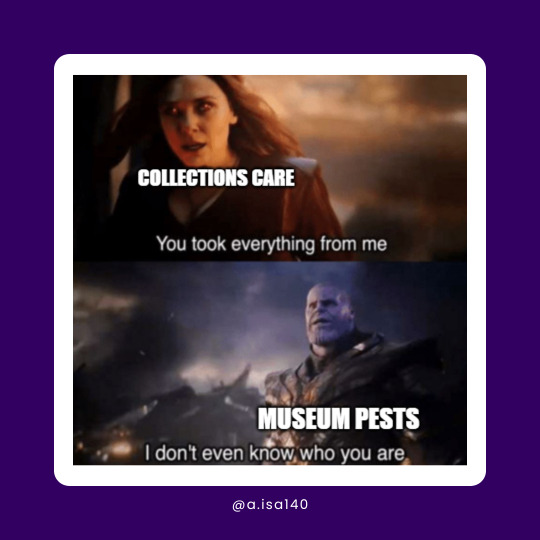
This is what talking to your insect pests feels like.
___
Follow for more memes from the GLAM world 🖼📙🗄🏛
GLAM - 🖼Galleries📙Libraries🗄Archives🏛Museums
.
.
.
#conservation#collectionscare#preservation#heritage#art#careofcollections#museums#conservators#preserve#restoration#collections#ipm#integratedpestmanagement#pests#insects#objects#memes#memer#memedaily#museum#museummemes#conservationart#museumconservation
20 notes
·
View notes
Photo
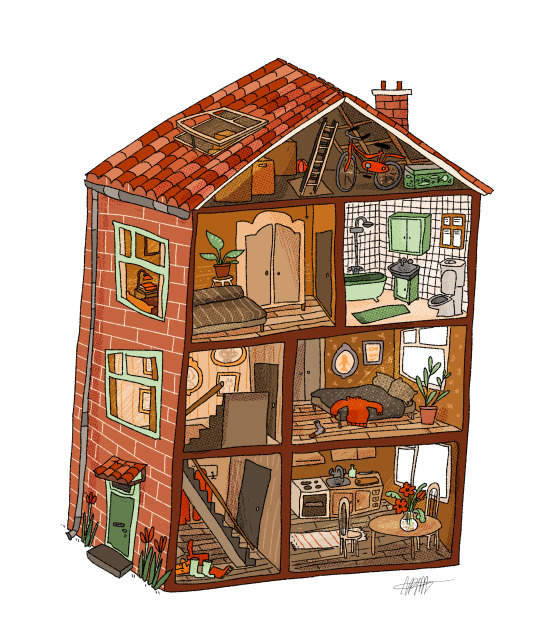
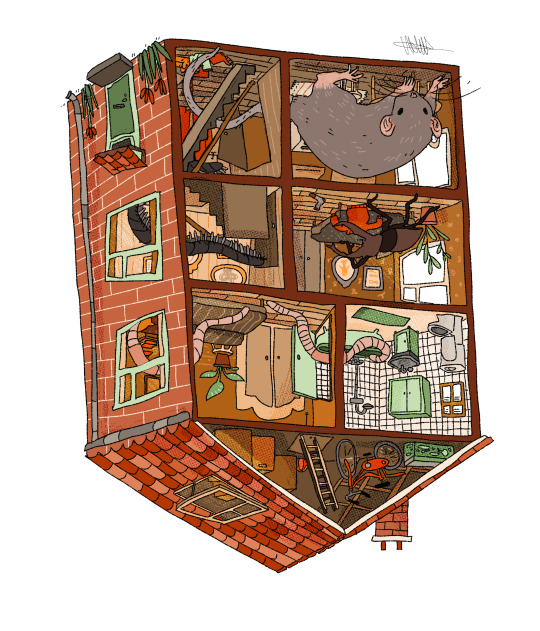
Isn’t every house haunted?
102 notes
·
View notes
Text
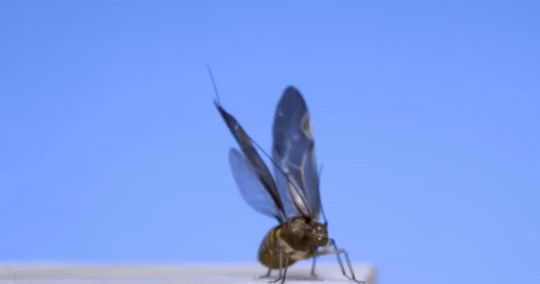
#photography#explore#nature#science#adorable#gifs#education#lol#booklice#psocoptera#psocodea#hemipteroids#barkflies#grain-eating#pests#insect#entomology#animals#herbivorous#invertebrates#zoology#ecology#flying#wings#wing#slow motion#gif#fly#flight#amazing
27 notes
·
View notes
Text
I'm having a nightmarish time with my pepper plant. It's not the plant, she's great, I love her so much, it's the... the bugs.
I've had a pepper plant sprout on my balcony, in a pot, accidentally, she volunteered to grow. Cheered up by this, I decided to see if I can keep the baby plant alive during the winter, by placing her inside, so she could be my first pepper plant in the spring, and make peppers early, which would be absolutely wonderful.
So, by the time it was frosting outside, she was trying to flower, and I brought her inside; I created a little shelf in the kitchen, just by the windows, where she'd be getting plenty of light, and would be the first thing I look at when I enter the kitchen. This worked beautifully, she would cheer me up every time I entered the kitchen, green and big and beautiful.
However, only 2 days in, I realized her leaves are getting little holes in it, and by more observation, I noticed she had an infestation of plant lice. The bugs would have likely died outside in the frost, but since I brought them in, they were prospering. Annoyed, I brought the plant with me to the shower, and hosed down all of those bugs with water, so they would fall into the bath and I could get rid of them.
The plant was a little stressed out from it, but free from bugs. 3 days later, new bugs! I hosed them down again, stressing the plant out, but I think the plant realized that hosing down would not damage her, and she recovered more quickly this time. 2 days later, new bugs.
So now I'm like, okay, what remedies do we know for plant lice? I sprayed the entire plant with soapy water, which I remember was supposed to like, make bugs unable to hold onto the plant or something. No effect. Then I made a nettle infusion, remembering nettle could be poisonous to them, but the bugs did not care whatsoever.
Then, I accidentally saw in a gardening video, the way another gardener was over-wintering the pepper; they clipped all of her leaves, and only the stem was preserved! The thought of doing that to my plant was painful, even if it would get rid of the bugs, as they would have nothing to eat. I tried spraying more, didn't help, so eventually I caved, took some scissors, and cut off all of the big leaves. I left a few tiny ones, that would be too small for bugs to eat, and I wanted the plant to have at least some greenery on her, so it wouldn't be too sad.
The plant got VERY stressed from this, I could tell she wasn't happy. But she was also determined, and started growing those new leaves super quickly, I could observe by the day how much bigger they got. I also monitored them for bugs, and as there was nothing for the first 3 days, I thought we were done. A week in. New bugs.
Now why am I so upset about these bugs if they're only messing with my pepper which doesn't really need the leaves? Well, that is because very soon, after the winter solstice, which is now a week away, I will be planting new seedlings for the next spring. First about 10, then 20 and 30 and then over 60 little plants will be on that same shelf. And the bugs absolutely will attack them all. I could lose my entire garden if I don't get this under control.
I need to either resolve the bug infestation (and I don't wanna cut off these last few leaves! The plant really wants to keep them!) or put my pepper plant somewhere else, isolated and in darkness, which would make us both very sad. So, anyone ever got rid of some plant lice successfully? I've never had them inside before, and I've already exhausted all my ideas.
16 notes
·
View notes
Text
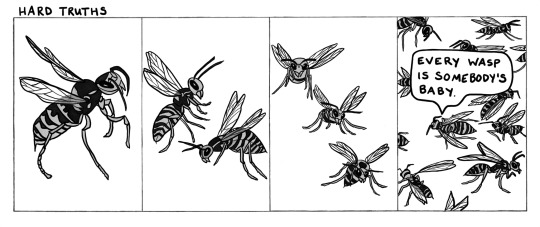
Wow it's been a while guys. Hi!
#loveamongthelampreys.com#comics#cartoons#wasps#fuck wasps#baby#somebody's baby#hard truths#insects#pests
41 notes
·
View notes